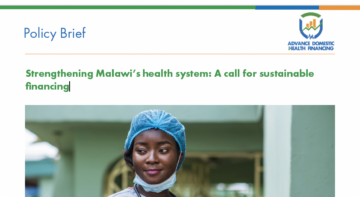
Sepsis is a life-threatening condition resulting from severe infection and is a leading cause of preventable death worldwide. With its high burden of infection, Africa is expected to bear a disproportionate proportion of global sepsis. The huge human and financial costs associated with sepsis can be attributable to its under-prioritisation in health systems, in terms of resourcing, surveillance, and reporting. In low and middle-income countries (LMICs), including much of Africa, a significant proportion of sepsis can be attributed to the consequences of weak health systems, including poor sanitation and hygiene as well as poor quality health care. Priority investments for preventing sepsis in Africa include: introducing awareness and advocacy campaigns, improving sanitation and hygiene in health facilities, measuring and collecting data on sepsis, and conducting research to fill in sepsis management evidence gaps. Actionable policy recommendations are outlined in this brief.
Related Publications





